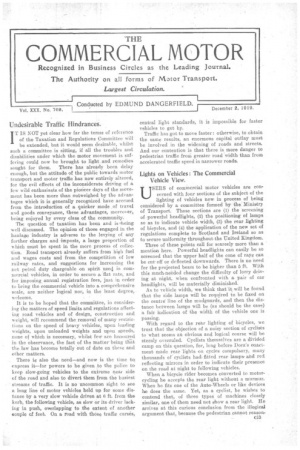Undesirable Traffic Hindrances.
Page 1

If you've noticed an error in this article please click here to report it so we can fix it.
IT IS NOT yet clear how far the terms of reference of the Taxation and Regulations Committee will be extended, but it would seem desirable, whilst such a committee is sitting, if all the troubles and disabilities under which the motor movement is suffering could now be brought to light and remedies sought for them. There has already been delay enough, but the attitude of the public towards motor transport and motor traffic has now entirely altered, for the evil effects of the inconsiderate driving of a few wild enthusiasts of the pioneer days of the movement has been more than outweighed by the advantages which it is generally recognized have accrued from the introduction of a quicker mode of travel and goods conveyance, these advantages, moreover, being enjoyed by every class of the community. The question of taxation has been and is sbeing well discussed. The opinion of those engaged in the haulage industry is adverse to the levying of any further charges and imposts, a large proportion of which must be spent in the mere process of collection. Road transport already suffers from high fuel and wages costs and from the competition of low railway rates, and suggestions for increasing the net petrol duty chargeable on spirit ,used in commercial vehicles, in order to secure a fiat rate, and for imposing. annual registration fees, just in order to bring the commercial vehicle into a comprehensive scale, are neither logical nor, in the least degree, welcome. .
It is to be hoped that the committee, in considering the matters of speed limits and regulations affecting road vehicles and of design, construction and weight, will recommend the removal of many restrictions on the speed of heavy vehicles, upon loading weights, upon unloaded weights and upon speeds, none of which is necessary, whilst few are honoured in the observance, the fact of the matter being that the law has become totally out of date on these and other matters.
There is also the need—and now is the time toi express it—for powers to be given to the police to keep slow-going vehicles to the extreme near side of the road and also to divert them from the busiest streams of traffic. It is no uncommon sight to see a long line of motor vehicles held up for some distance by a very slow vehicle driven at 6 ft. from the kerb, the following vehicle, as slow or its driver lacking in push, overlapping to the extent of another couple of feet. On a toad with those traffic curses, central light standards, it is impossible for faster vehicles to get by. Traffic has got to move faster : otherwise, to obtain the same results, an enormous capital outlay must be involved in the widening of roads and streets. And our contention is that there is more danger to pedestrian traffic froth greater road 'width than from accelerated traffic speed in narrower roads.


























